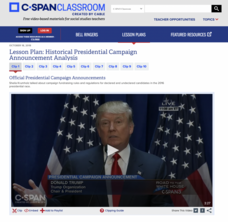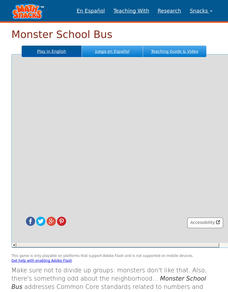Nemours KidsHealth
Keep Your Brain in the Game: Grades 3-5
Boost physical activity as well as concept proficiency with brief bursts of movement. Before taking a test, scholars vote on five exercises to complete from a set of 8 cards. After two minutes, learners begin their work with heightened...
Greater Good Science Center
Nurturing Gratitude From the Inside Out: 30 Activities for Grades K–8
Teach the importance of showing gratitude at any age with a teacher's guide comprised of thirty activities. Browse the extensive table of contents to find the array of exercises designed to meet the needs of your learners. Scholars take...
C-SPAN
Historical Presidential Campaign Announcement Analysis
Using the announcements of presidential candidacies, pupils consider how contenders make their initial arguments to the public. A worksheet helps structure collaborative work to analyze 10 video clips. Writing prompts allow for extension...
Facing History and Ourselves
The Challenge of Confirmation Bias
Confirmation bias makes it difficult to overcome our preconceived notions of others. That's the big idea in a activity that teaches learners strategies to recognize and question their biases.
Facing History and Ourselves
Transcending Single Stories
The focus of the second lesson in the Standing Up for Democracy unit is on the power of assumptions based on a single experience or point of view. Class members begin by journaling about assumptions others make about their identity based...
New Mexico State University
Number Rights
You do not have to be whole to be important. Individuals watch a video on the importance of rational numbers on the number line. Scholars use their knowledge to rename numbers on the number line as well as place rationals on a number...
New Mexico State University
Pearl Diver
Dive into the number line. Learners play a computer game that revolves around a number line as they try to collect pearls by diving at locations on a number line. As the game progresses, dive locations change from simple whole numbers to...
New Mexico State University
Monster School Bus
Load up the bus. Pupils play a game where they control a bus to pick up a certain number of monsters for school. Learners develop strategies to make sure they have a full load and score the most rewards. As scholars work through the...
New Mexico State University
Game Over Gopher
Coordinate an attack on hungry gophers. Scholars play a game that relies on placing objects on the coordinate plane to stop gophers from eating a carrot. As the game levels increase, learners encounter different scales and the need to...
New Mexico State University
Atlantean Dodgeball
Develop ratios within sporting games. Class members watch a video about dodgeball and see how coaches compare the scores. Pupils then work with ratios to compare the scores throughout the tournament. Using their knowledge of ratios, they...
PBS
Who, Me? Biased?: Understanding Implicit Bias
A 10-page interactive explains different facets of implicit bias, demonstrates how implicit bias works, and how people can counteract its effects. The interactive tools permit users to save their information in "My Work" folders, to take...
New Mexico State University
Bad Date
Get the best ratio for a good date. The class watches a video where dates are rated based on the ratio of words spoken. Pupils then use the ratios in the video along with other given ratios to find equivalent ratios. Finally, they...
Collaborative for Academic, Social, and Emotional Learning (CASEL)
Examples of Social and Emotional Learning in Elementary Mathematics Instruction
A 12-page document lists an abundance of math-related activities that boost social and emotional topics; self-awareness, self-management, social awareness, relationship skills, and responsible decision making.
Indiana Department of Education
Social Emotional Toolkit
Looking for some tools to help you incorporate social and emotional learning into your curriculum? Then check out this 79-page kit packed with ideas for developing social-emotional learning competencies. The first section provides...
Core Knowledge Foundation
Maya, Aztec, and Inca Civilizations
A 10-lesson unit explores the Maya, Aztec, and Inca civilizations. Over the course of two weeks, scholars read nonfiction excerpts, discuss their findings, and complete activities. An assessment equipped with multiple choice and matching...
EngageNY
Grade 5 Math Module 1, Topic D, Lesson 10
Take a little bit away. The 10th section of an 18-part unit introduces subtraction of decimals. Scholars use a place value chart like they did with addition of decimals to organize and represent the problem. After using the place value...
EngageNY
Grade 5 Math Module 1, Topic D, Lesson 9
Introduces addition of decimals by using unit notation to represent the problem. Pupils use a place value chart to decompose the numbers and then add before connecting to the standard algorithm.
EngageNY
Grade 5 Math Module 1, Topic C, Lesson 8
Go another round on rounding. Pupils refine their learned rounding skills in the eighth installment in an 18-part unit on decimals. The lesson takes away some of the previous scaffolding to encourage scholars to use the procedures that...
EngageNY
Grade 5 Math Module 1, Topic B, Lesson 6
Which is bigger? The sixth installment in an 18-part series covering decimals provides a lesson on comparing decimals to the thousandths. Teachers use place value to help class members compare and order decimals. Instruction encourages...
EngageNY
Grade 5 Math Module 1, Topic B, Lesson 5
There is more than one way to write a number. The lesson plan provides teachers with a way to teach reading and writing decimals to thousandths using standard, expanded, and unit forms. Pupils work through in-class and homework...
EngageNY
Grade 5 Math Module 1, Topic A, Lesson 4
Convert with exponents. The fourth lesson in a series of 18 uses powers of 10 to convert within the metric system. Scholars use their fourth grade knowledge of conversions to write and use the conversion factors containing exponents....
EngageNY
Grade 5 Math Module 1, Topic A, Lesson 3
The activity introduces exponents as a way to write powers of 10 and to associate those powers with place value. Pupils practice writing powers of 10 with exponents along with multiplying numbers by powers of 10. The resource is the...
EngageNY
Grade 5 Math Module 1, Topic A, Lesson 2
What are the place value patterns? An informative lesson plan helps scholars build upon their knowledge of place value to see patterns when multiplying and dividing by powers of 10. Classmates begin the second installment by reviewing...
EngageNY
Grade 5 Math Module 1, Topic A, Lesson 1
Extend the place value system. The first lesson plan in a series of 18 extends the place value system to millions through thousandths. Using place value charts, pupils see how the value of a digit changes as it moves places. Teachers use...

























